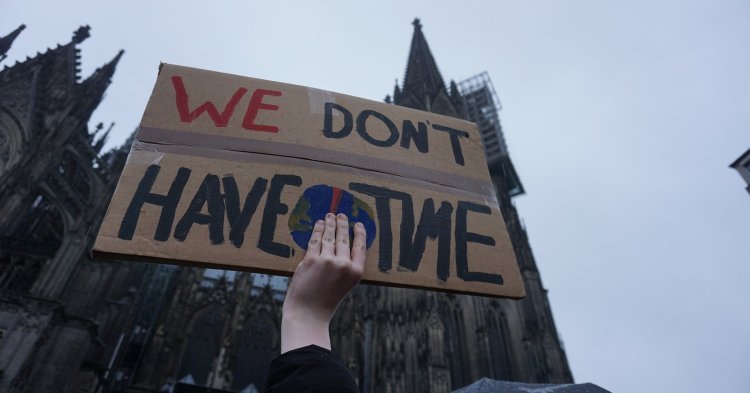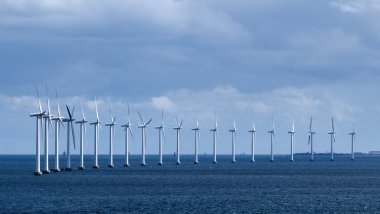The demonstrations are taking place during school hours, which is why we talk about ‘strikes’. Young people deliberately give up on their right to education because they can hardly draw attention otherwise. In the middle of a climate and environmental crisis, the demonstrations follow the logic that investing in your education serves no purpose as the future is uncertain because of the politicians’ inaction in the face of the climate urgency. As Greta Thunberg, who has become the youth movement’s voice, put it: “What is the point of learning facts when the most important facts given by the finest scientists are ignored by our politicians?” Or even denied, as in the case of the current President of the United States? The movement aims at giving all decision-makers in the world the message that acting on a big scale is urgent.
What the young demonstrators want is simple: that the governments respect the 2015 Paris Agreement aiming at limiting global warming by 1.5°C, which implies a massive reduction of carbon emissions, starting now. To reach this target, they propose different solutions depending on the countries, but introducing taxes on carbon emissions and putting an end to fossil energy subsidies are often quoted in their demands. Some consider that these demands are too extreme, and so “politically unfeasible”. They could indeed be classified as extreme, as they imply changing the current energy consumption and production system, but these demands are actually a consequence of the politicians’ inaction that has lasted for years. Scientists have warned about the dangers of global warming for more than forty years. One could thus wonder about the purpose of politicians these days.
The youth against the system in place
If young people have to mobilise because of the adults’ inaction, we could consider that the politicians’ main purpose to serve the people they represent seems to have been lost. We can have the impression that decision-makers worldwide act first and foremost with the objective of being re-elected, with short-term politics, and that it pushes them to inaction in the face of climate change. Because those who would think long-term, introduce carbon emissions taxes, close coal-power stations or cut subsidies to fossil energies industries, would probably not be re-elected. But postponing action against global warming won’t serve the future generations. Politics should rely on science to protect the next generations’ future, and this is what the young demonstrators are demanding.
Those who will be the most concerned by climate change and non-sustainable practices of international trade are people who are still children today. These are people who have no political leverage, no voice, as they cannot elect their representatives. What other choice is left apart from going to the streets to make yourself heard? In France, a “Wake up call on the environment: a student manifesto” was written by students from HEC Paris, AgroParisTech, CentraleSupelec, Ecole Polytechnique and ENS Ulm, and has been signed by more than 30,000 students so far, which shows that more and more youngsters do not wish to maintain the capitalist system of overconsumption and of a supposedly indefinite growth that destroys the planet. The industry practices and the jobs offered by this system often go against what is taught in schools and universities and what the scientists foresee.
The European Union as a major stakeholder
Several scientists have expressed their support to the Fridays for Future movement, for example in an open letter signed by more than 3,000 scientists. The European Parliament also expressed its support to the demonstrations and invited Greta Thunberg to meet the European Parliament President and to deliver a speech on 16 April in front of the last plenary of the Committee on Environment, Public Health and Food Safety, before the European elections.
Thunberg addressed the MEPs and asked them to put their differences aside to fight against climate change. She also expressed the frustration felt by more and more people concerning political priorities: three emergency summits were organised on Brexit, but none on the climate and environmental crisis. The MEPs applauded and confirmed that the fight against climate change and for environmental protection would be one of the most important issues. Yet, if we take a look at the EU institutional resources dedicated to the environment, it doesn’t seem to be a lot. One example: among more than 150 Council preparatory bodies, only two are dedicated to the environment configuration, whereas 14 are dedicated to the competitiveness configuration of the Council.
The European Union is a major player in the fight for climate, because a large-scale action needs interstate cooperation. One country alone does not have enough power in front of the huge multinational companies, which have often no interest in reducing their carbon emissions. The European Commission proposed possible solutions to reach a climate-neutral economy by 2050 in its communication “A Clean Planet for all” last November. However, in this communication, among the eight proposed pathways, only two would reach greenhouse gas neutrality before 2050. The Parliament expressed its support to these two scenarios.
The Parliament has also pointed to the jobs that can be created through green transition, for example saying in 2015 that improving resource efficiency could bring between 1.4 and 2.8 million jobs. However, the actions are still to be taken, as the European Union still funds fossil energies and since 2015, carbon emissions have been increasing again.
Voting for a green transition
Climate change is not an abstract and far prospect anymore, only warned by some scientists. Today, the multiplication of wildfires – including in the Arctic region –, the melting of ice sheets, the rise in sea level, the soil desertification and extreme weather conditions are already consequences of it. The situation will continuously worsen, and developing countries which participated less to greenhouse gas emissions will be the most affected.
Not going beyond 1.5°C of global warming and avoiding the worst scenario is still possible. The money to fund a green transition exists, but the political will is missing. In 2008, we could see that acting fast and efficiently was possible during a crisis, but when the crisis is not economic but environmental, the money to save the planet does not seem easy to find. Yet, the costs of inaction are much higher than those of action. According to the Stern Review on the Economics of Climate Change published by the British government in 2006, the cost of the fight against climate change would amount to 1% of the world GDP, whereas the cost of inaction would represent 5 to 20%.
Besides changing our own consumption habits, we can vote for a party that proposes solutions and which doesn’t deem the necessary measures to take at the time of climate emergency to be “politically unfeasible”. Most of the youngsters marching in the streets do not have this possibility. Those of us in voting age have to give more power to those who subscribed to change the system rather than the climate. However, voting once in five years is not enough.
It is time to resort to non-conventional ways of political participation, as signing petitions, demonstrating and going on strike. Civil society has to put pressure on politicians for the next generations to have a future on this planet, just like the youth is doing at Fridays for Future when they go to the streets. Because politics must serve people in the long term, and not contenting itself with short-term actions allowing to be re-elected.





Follow the comments: |
|
